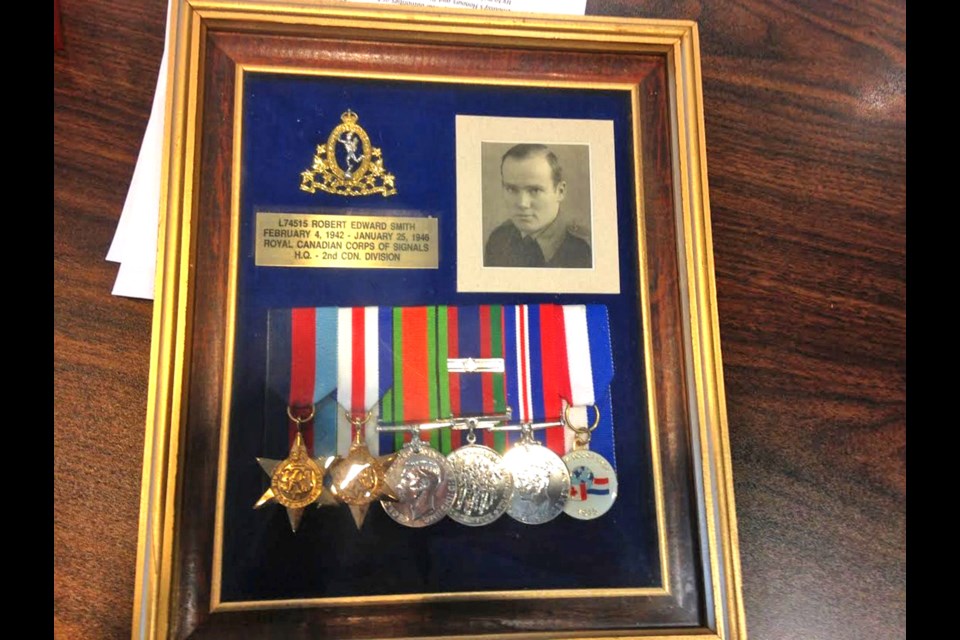On Nov. 10, Ed Smith’s phone at Caleb Village was buzzing. The legion, the radio station and others wanted to get a hold of him.
Smith was awarded to the rank of Knight of the French National Order of the Legion of Honour. According to a letter from the Ambassador of France to Canada, Kareen Rispal, the Legion of Honour is the highest national order of France.
“It is awarded in recognition of your personal involvement in the liberation of our country during World War II."
“I got a parcel, special delivery, and I didn’t know what it was,” Smith said, of the letter he received on Nov. 8. “After lunch I opened it up, and it was this letter that came from the embassy in Paris, from French government.”
The award isn’t Smith’s first. He keeps his war medals fixed inside a frame, which is why he doesn’t wear his war medals to services.
Smith grew up on a farm near Lone Rock, about 17 miles south of Lloydminster.
Smith, who is 95 now, was 17 when World War II began in 1939. Smith’s father, who was a policeman in Ireland before the family immigrated to Canada in 1922, enlisted soon after the war began. Ed also enlisted.
In 1942, Smith was supposed to go to Vernon, B.C., for basic training, but got the mumps and landed in quarantine for three weeks. He eventually took two months of training in Guelph, until he was told he was given ten days leave before going overseas.
“Oh my god,” Smith said, referring to his feelings at the time. “I just got into the army.”
Smith took a train from Guelph to Kingston, where he joined the signal corps. After six weeks in Kingston, he went to Halifax, then across the ocean to the north of Scotland, followed by Farnborough in southern England, known for its Royal Aircraft Establishment. Smith took more training at a nearby army camp.
“Then they says you’re going to be in the signal corps and you’ll have to take classes all day long,” Smith said. He learned things such as morse code and why underground cable was used.
Smith’s next assignment was in a town called Billingshurst, 200 miles from the south coast of England. He was involved with running the signal office and telephone exchange, among other tasks.
Dover was next for more training, where Smith was for a year. Smith caught pneumonia, and he was in a hospital in Farnborough when wounded from the Dieppe raid, which had occurred on August 19, 1942, were transported to the military hospitals in the area.
“It all stood out in my memory, that day in ‘42,” Smith said.
Smith landed in France in July of 1944, about a month after D-Day, which occurred on June 6, 1944.
After passing quickly through Caen, Smith said he was involved in an operation that took Falais from the Germans in July and August 1944.
In the winter of 1944, Smith along with two others stayed in the upstairs of a home with an elderly couple in Nijmegen, in the Netherlands.
The Germans surrendered in May 1945, although Smith stayed in Germany until close to the end of the year.
“Priorities,” Smith said. “Some fellows got back in May, June, July, but we were some of the last to get from Port of Ostend (in Belgium) over to Southampton.”
Some of the waiting was made up for by sailing across the Atlantic in the RMS Queen Elizabeth to New York. Halifax would have been the destination if it hadn’t been snowed over at the time.
“It was a beautiful ship,” Smith said.
The train ride home consisted of a trip to Trenton, New Jersey, then from Trenton to Hamilton, then to Regina. Smith got home to the farm on Dec. 6, 1945, and a discharge on Jan. 6, 1946, in Regina.
“It was a long spell, four years,” Smith said. “A lot of water went under the bridge.”
Veterans Affairs then helped Smith take an accounting course in Saskatoon, and he was keeping books for the Mercury-Lincoln dealer in Biggar. After more work selling car parts, and being sales manager at car dealerships, Smith eventually became deputy sheriff and deputy registrar at the Battleford courthouse. Smith worked at the courthouse until 1987.
These days, Smith visits family and friends, along with participating in Caleb Village activities. He said he’s read much about the war, and occasionally has coffee with local historian Don Light.
Remembrance Day is important for Smith because it pays tribute to the army, Navy and Air Force.
“Across the country, coast to coast, it makes everybody realize that it’s celebrating peace,” Smith said.



